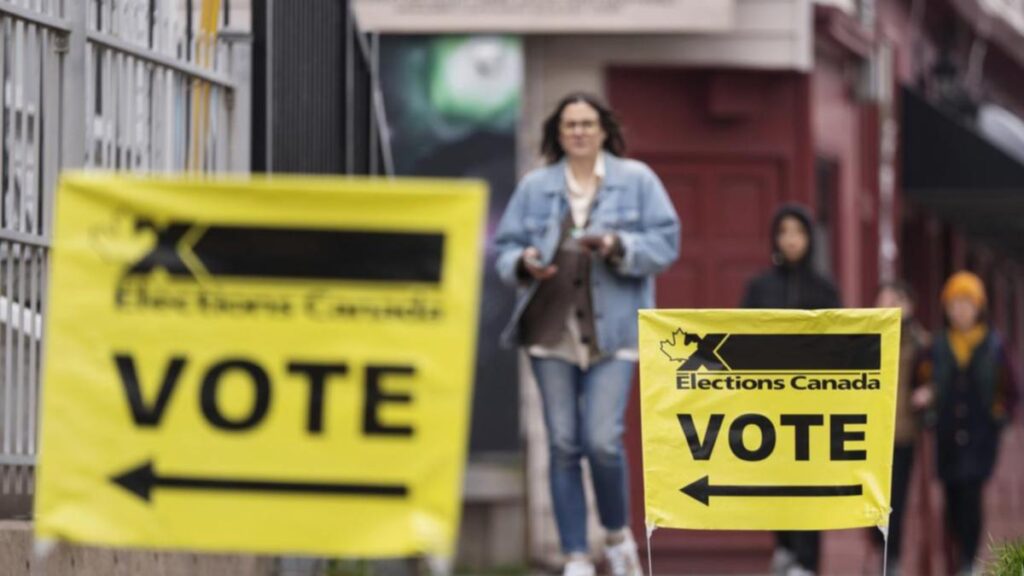Canadians are going to the polls after an election campaign in which US President Donald Trump’s tariffs and musings about annexing Canada became the central issue.
Trump’s threats ignited a wave of patriotism that swelled support for Liberal Prime Minister Mark Carney, a political newcomer who previously led two G7 central banks.
The campaign ended on a sombre note on Sunday after a man rammed an SUV through a crowd at a Filipino community festival in Vancouver, killing at least 11 people and injuring dozens.
Carney briefly paused his campaign, and both he and Conservative leader Pierre Poilievre mentioned the tragedy in their final campaign events. Duane Bratt, professor of political science at Calgary’s Mount Royal University, said he did not expect the mass casualty event to deter voters.
Carney’s Liberals held a 2.7-point lead over Poilievre’s Conservatives in national support, according to a CTV News-Globe and Mail-Nanos poll released on Sunday. Nanos pegged the Liberals at 42.6 per cent support and the Conservatives at 39.9 per cent, in the poll.
An EKOS poll on Sunday suggested the Liberals hold a six-point lead, and projected the Liberals to win a majority of seats in the 343-seat House of Commons and not need to rely on a smaller party to govern.
Trump re-emerged as a campaign factor last week, declaring that he might raise a 25 per cent tariff on Canadian-made cars because the US does not want them. He said earlier he might use “economic force” to make Canada the 51st US state.
Carney has emphasised his experience handling economic issues makes him the best leader to deal with Trump, while Poilievre has tapped into concerns about the cost of living, crime and a housing crisis.
Trump, in a social media post on Monday, reiterated his call for Canada to become the 51st state.
“Good luck to the Great people of Canada,” he said.
“Elect the man who has the strength and wisdom to cut your taxes in half, increase your military power, for free, to the highest level in the World, have your Car, Steel, Aluminum, Lumber, Energy, and all other businesses, QUADRUPLE in size, WITH ZERO TARIFFS OR TAXES, if Canada becomes the cherished 51st. State of the United States of America. No more artificially drawn line from many years ago.”
Standing on Sunday in front of the Ambassador Bridge connecting Windsor’s Canadian auto hub with Detroit across the border, Carney pointed to the bridge as a symbol of peace and cooperation between the two countries for almost a century.
“That has changed, and it wasn’t us who did the changing … President Trump, the guy over there,” Carney said.
“He’s launched a trade war that has literally ruptured the global economy, and in the process, he’s betrayed us.”
Poilievre has attracted more young voters than usual for the Conservatives, focusing his campaign more on living costs and crime.
“Time is running out, only one more day to bring home change so that Canadians can afford food and homes and live on safe streets,” Poilievre said at a rally in Oakville, Ontario on Sunday.
Carney has sought to distance himself from former Liberal Prime Minister Justin Trudeau, who was deeply unpopular when he said in January he would resign after nearly a decade in power. The Conservatives led polls by some 20 points around that time.
The economy had seen a fledgling recovery until the US imposed tariffs.
A party needs to win 172 seats to form a majority government.
Much of the Conservative support is in rural areas where there are fewer seats.
Carney, who covered more than 20 cities in his last week of campaigning, has appeared tired but tried to maintain his exuberance at rallies, attended by 1000 to 2000 people, according to party figures.
Carney’s rallies have attracted mostly older Canadians and featured placards saying “Jamais Le 51” (“Never 51”) and “Un Canada Fort” (“A Strong Canada”).
Mentions of Trump have been loudly booed.
Poilievre’s rallies have been bigger and mentioned Trump less often.
Election results will trickle in, starting in eastern provinces, after polls close at staggered times on Monday evening. Ballots are counted by hand.
https://thewest.com.au/politics/canadians-vote-in-election-dominated-by-trump-concerns-c-18517412


